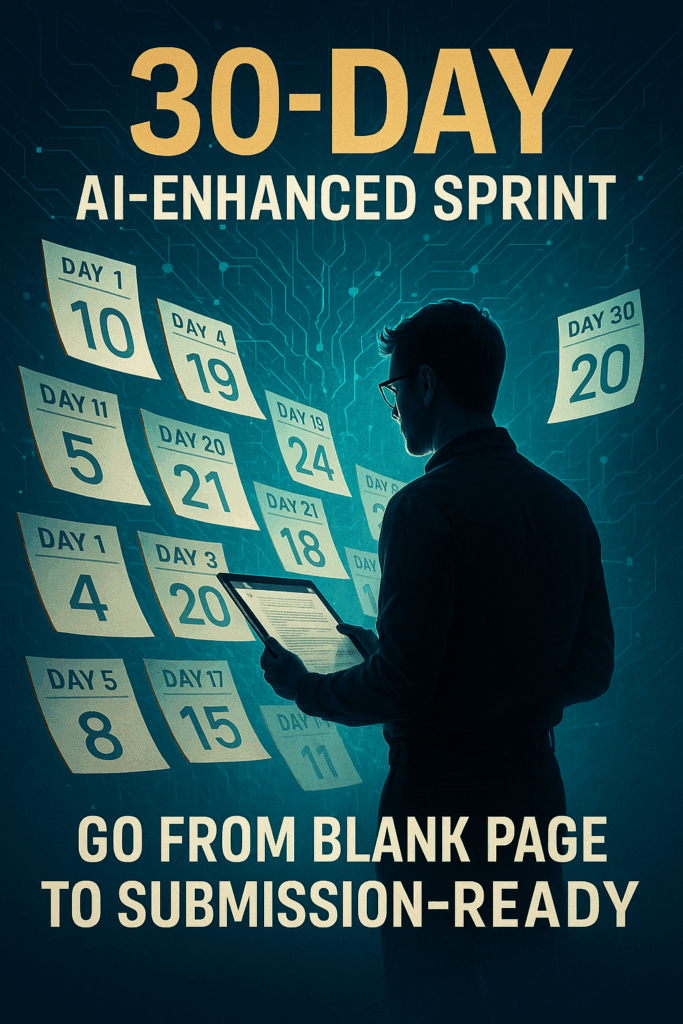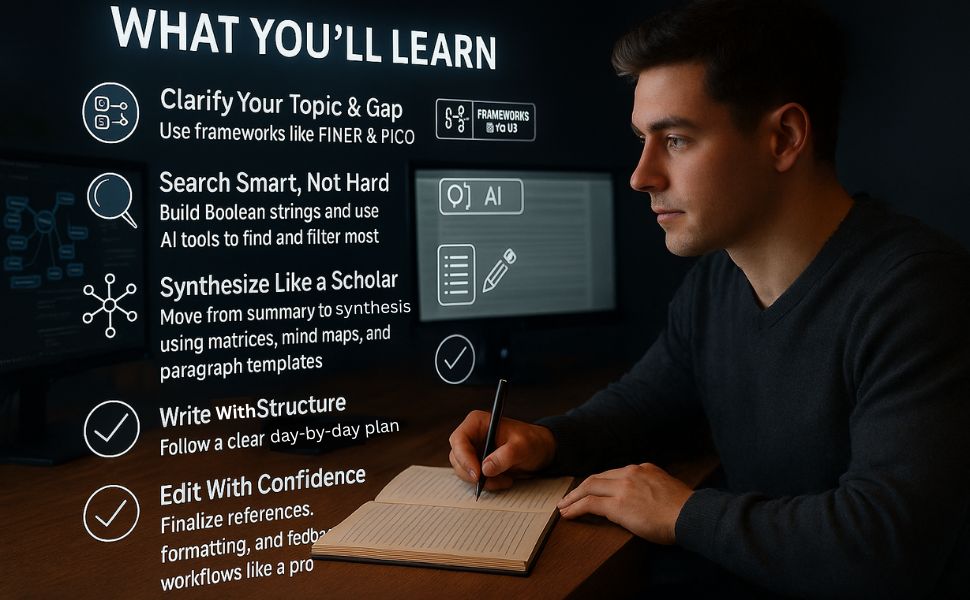
Join the Dissertation Literature Review Course—a structured, AI-enhanced course built to turn your PDF overload into a submission-ready chapter, fast.

Are you stuck staring at a blank screen while your supervisor expects a literature review chapter next week?
You’re not alone—and you’re not behind. Most PhD researchers are never taught how to write their literature review, let alone how to finish it fast, with clarity, structure, and confidence.
Most students struggle not because there’s a lack of literature—but because there’s too much. The key isn’t to read more—it’s to read better.
That’s exactly what the Dissertation Literature Review Sprint course is designed to change.
The AI-Powered Sprint for PhD Students Who Want Results, Not Burnout
This course transforms what feels like an overwhelming mountain of research into a structured, step-by-step 30-day writing sprint—fueled by ethical AI tools, proven academic strategies, and practical daily wins.

Meet Your Guide
Dr. Rafiq Muhammad, MD, MIHMEP, PhD
Data Scientist, researcher, and bestselling author of the Mastering Research series. With over a decade of mentoring experience and a PhD from Karolinska Institute Sweden, Dr. Rafiq has helped hundreds of graduate students transform their writing process—faster, smarter, and with clarity.

Here is why you need to enroll now:
- Beat the Blank-Page Panic
Day-by-day tasks guide you from zero to first draft—no more staring at an empty screen. - Work Smarter, Not Longer
Proven academic methods + ethical AI prompts slash busywork so you can focus on analysis and writing. - Guaranteed Momentum
Daily micro-wins and accountability rituals keep you on track—even when motivation dips. - Submission-Ready in One Month
By Day 30 you’ll have a fully polished, properly cited, department-approved chapter.

Imagine this:
- Your research question is finally focused and defendable.
- Your sources are tagged, organized, and connected in Zotero.
- Your review is structured, thematic, and flows like a published paper.
- You’ve used AI to accelerate your writing—not replace it.
- You’re ready to submit, with citations and formatting fully aligned with your department’s requirements.
What You’ll Learn
- Clarify Your Topic & Gap: Use frameworks like FINER & PICO to shape a defensible research question.
- Search Smart, Not Hard: Build Boolean strings and use AI tools to find and filter the most relevant literature.
- Synthesize Like a Scholar: Move from summary to synthesis using matrices, mind maps, and paragraph templates.
- Write With Structure: Follow a clear day-by-day plan to write every section—introduction, thematic bodies, conclusion.
- Edit and Polish: Apply revision layers using AI tools like Grammarly, scite.ai, and Paperpal.
- Submit With Confidence: Finalize references, formatting, and feedback workflows like a pro.


30 Days to a Submission-Ready Literature Review Chapter
Write Smarter, Not Harder: 30-Day Lit Review Bootcamp

Phase I: Define & Discover (Days 1–5)
Build the foundation for your review.
Kick off your sprint by clarifying your purpose, honing your question, and assembling the vocabulary that powers every search. These first five days lay the groundwork for a literature review that is strategic, focused, and driven by AI-enhanced precision.
Day 1: Uncover the true purpose of a literature review, pinpoint why so many students stall at this stage, and set your own success criteria.
Day 2: Transform your broad topic into a razor-sharp research question using AI-guided frameworks (PICO, FINER, SMART) that guarantee clarity and feasibility.
Day 3: Build a master keyword arsenal—synonyms, controlled vocabulary, and Boolean logic—powered by ChatGPT, MeSH on Demand, and litsearchr.
Day 4: Execute precision searches across PubMed, Scopus, Consensus, and more, leveraging proximity operators and semantic filters to cut straight to high-impact studies.
Day 5: Screen and triage hundreds of abstracts in minutes with Rayyan’s AI-assisted tagging and scite.ai’s citation-context badges, so you only dive into your most relevant sources.
Phase II: Organize & Evaluate (Days 6–10) Turn chaos into clarity.
With your raw materials in hand, it’s time to organize, appraise, and extract the insights that will become your narrative’s backbone. This phase transforms a disordered PDF pile into a living, searchable research library—and surfaces the themes you’ll write about.
Day 6: Build your AI-synced research library in Zotero—auto-fetch PDFs, enforce consistent file naming with ZotFile, and tag by theme for instant retrieval.
Day 7: Skim strategically using Scholarcy and Elicit: classify sources into High/Medium/Low relevance, extract study aims and samples, and keep only the evidence that matters.
Day 8: Take synthesis-ready notes—paraphrase core findings, add reflective commentary, and populate your literature matrix for seamless paragraph writing.
Day 9: Discover overarching themes with VOSviewer co-occurrence clustering and NVivo auto-coding; draft your theme codebook to guide your chapter structure.
Day 10: Visualize connections with concept-mapping tools like XMind and InfraNodus and refine your structured matrices—your storyboard for a coherent, flowing review.
Phase III: Write the Review (Days 11–17)
From outline to compelling narrative.
Now the real writing begins. You’ll move from structured planning to persuasive prose, crafting each section with intention—every paragraph driving toward your research gap.
Day 11: Critically appraise your curated studies with JBI checklists and scite.ai signals; spotlight the precise gaps your work will address.
Day 12: Create a funnel–thematic outline that flows from broad context to specific gap, using parallel headings and citation anchors for easy drafting.
Day 13: Write a magnetic introduction—frame the topic’s importance, define your scope, and preview the thematic journey ahead.
Days 14–15: Draft your first two thematic sections using the PEEL framework—present your point, evidence, interpretation, and a link to the next idea.
Day 16: Tackle contradictions head-on by crafting debate-style paragraphs that demonstrate scholarly rigor and deepen credibility.
Day 17: Conclude by weaving your themes back into the gap statement and previewing your methodology, setting up a seamless transition to Chapter 3.
Phase IV: Polish & Finalize (Days 18–25)
Elevate your prose and perfection-test your draft.
With your arguments in place, it’s time to refine style, cement accuracy, and deliver a flawless chapter that commands attention for its content—and its presentation.
Day 18: Paraphrase ethically and cite flawlessly using a six-step OWL-approved paraphrasing method and APA in-text citation best practices.
Day 19: Automate your bibliography with Zotero, Mendeley, EndNote, or Paperpile; merge duplicates, enrich metadata, and test style-swaps in seconds.
Days 20–22: Enhance style and flow—read aloud to catch stumbles, convert passive to active voice, vary sentence structures, and integrate peer/AI feedback.
Days 23–25: Execute a three-pass revision (macro, meso, micro), then a final proofreading blitz for grammar, clarity, and formatting finesse.
Phase V: Transition & Reflect (Days 26–30)
Bridge to methodology and sustain your momentum.
As you close out the literature review, you’ll map your path forward—linking your findings to your research design and establishing systems that keep you energized for the next stages of your PhD.
Days 26–27: Craft your “bridge paragraph” from review gaps to research design; outline participants, instruments, and your analysis plan in a gap–method matrix.
Day 28: Master time-boxing, Pomodoro sprints, and accountability rituals to sustain momentum through data collection and beyond.
Day 29: Run your final pre-submission checklist—template compliance, backups, version control, and draft your submission email.
Day 30: Celebrate your achievement, reflect on lessons learned, and set SMART goals for Chapter 3 and the rest of your thesis journey.
Who is This Course For
This course is for you if:
You’re a Master’s or PhD student working on your thesis or dissertation.
You’re overwhelmed by literature, unsure how to organize or synthesize it.
You want to finish your review in a matter of weeks—not months.



